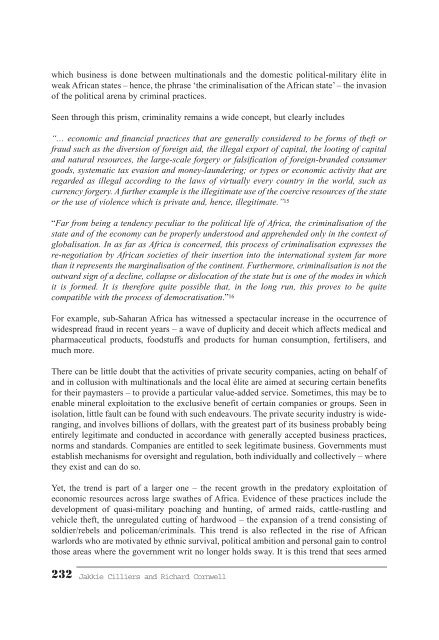Abbreviations - Institute for Security Studies
Abbreviations - Institute for Security Studies
Abbreviations - Institute for Security Studies
Create successful ePaper yourself
Turn your PDF publications into a flip-book with our unique Google optimized e-Paper software.
which business is done between multinationals and the domestic political-military élite in<br />
weak African states – hence, the phrase ‘the criminalisation of the African state’ – the invasion<br />
of the political arena by criminal practices.<br />
Seen through this prism, criminality remains a wide concept, but clearly includes<br />
“… economic and financial practices that are generally considered to be <strong>for</strong>ms of theft or<br />
fraud such as the diversion of <strong>for</strong>eign aid, the illegal export of capital, the looting of capital<br />
and natural resources, the large-scale <strong>for</strong>gery or falsification of <strong>for</strong>eign-branded consumer<br />
goods, systematic tax evasion and money-laundering; or types or economic activity that are<br />
regarded as illegal according to the laws of virtually every country in the world, such as<br />
currency <strong>for</strong>gery. A further example is the illegitimate use of the coercive resources of the state<br />
or the use of violence which is private and, hence, illegitimate.” 15<br />
“Far from being a tendency peculiar to the political life of Africa, the criminalisation of the<br />
state and of the economy can be properly understood and apprehended only in the context of<br />
globalisation. In as far as Africa is concerned, this process of criminalisation expresses the<br />
re-negotiation by African societies of their insertion into the international system far more<br />
than it represents the marginalisation of the continent. Furthermore, criminalisation is not the<br />
outward sign of a decline, collapse or dislocation of the state but is one of the modes in which<br />
it is <strong>for</strong>med. It is there<strong>for</strong>e quite possible that, in the long run, this proves to be quite<br />
compatible with the process of democratisation.” 16<br />
For example, sub-Saharan Africa has witnessed a spectacular increase in the occurrence of<br />
widespread fraud in recent years – a wave of duplicity and deceit which affects medical and<br />
pharmaceutical products, foodstuffs and products <strong>for</strong> human consumption, fertilisers, and<br />
much more.<br />
There can be little doubt that the activities of private security companies, acting on behalf of<br />
and in collusion with multinationals and the local élite are aimed at securing certain benefits<br />
<strong>for</strong> their paymasters – to provide a particular value-added service. Sometimes, this may be to<br />
enable mineral exploitation to the exclusive benefit of certain companies or groups. Seen in<br />
isolation, little fault can be found with such endeavours. The private security industry is wideranging,<br />
and involves billions of dollars, with the greatest part of its business probably being<br />
entirely legitimate and conducted in accordance with generally accepted business practices,<br />
norms and standards. Companies are entitled to seek legitimate business. Governments must<br />
establish mechanisms <strong>for</strong> oversight and regulation, both individually and collectively – where<br />
they exist and can do so.<br />
Yet, the trend is part of a larger one – the recent growth in the predatory exploitation of<br />
economic resources across large swathes of Africa. Evidence of these practices include the<br />
development of quasi-military poaching and hunting, of armed raids, cattle-rustling and<br />
vehicle theft, the unregulated cutting of hardwood – the expansion of a trend consisting of<br />
soldier/rebels and policeman/criminals. This trend is also reflected in the rise of African<br />
warlords who are motivated by ethnic survival, political ambition and personal gain to control<br />
those areas where the government writ no longer holds sway. It is this trend that sees armed<br />
232<br />
Jakkie Cilliers and Richard Cornwell
















